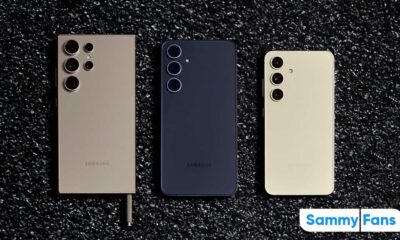News
Samsung speeds up XR device development, uses Google’s OS and Qualcomm’s Chip
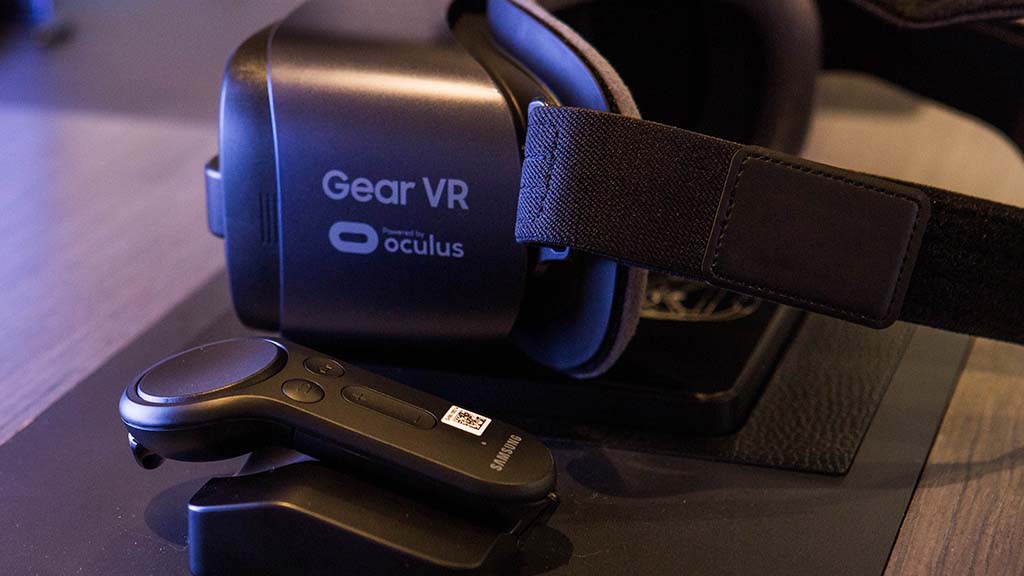
As Apple unveiled the VisionPro earlier this month, Samsung has accelerated its efforts to develop a new XR device, with an aim to release it as early as this year. The upcoming Samsung XR device would be equipped with OS by Google and a chipset by Qualcomm.
The report indicates that Samsung is focusing on AR glasses instead of VR headsets. It enhances connectivity with Galaxy devices such as smartphones, watches, and buds, and even possibly with its smart home platform SmartThings.
Follow our socials → Google News, Telegram, Twitter, FacebookSams
It’s most likely that Samsung’s AR glasses could be called Galaxy Glasses and Galaxy Space. The XR market is expected to grow rapidly as Meta has also unveiled its new VR headset “Quest 3” a few days prior to Apple’s VisionPro unveiling.
During the Galaxy S23 Unpacked, Samsung confirmed that it has partnered with industry giants for XR. Qualcomm, which is strong in chipsets, Samsung, with strength in displays including sensor views and products, and Google, a strong player in OS and services, will join forces to create a proper ecosystem.
Industry insiders see that a new era of the XR ecosystem will open in the first half of next year when Samsung and Apple set foot in the market. Participation of major players will spark competition for innovation although the products are somewhat highly priced and are still uncomfortable to wear.
The world’s attention is focused on the XR ecosystem that will be created by Samsung Electronics Co., the South Korean rival of global tech giant Apple Inc., in partnership with Google Inc. and Qualcomm Inc. after Apple kicked off a new wave of the XR market with its mixed reality (MR) headset Vision Pro.

Image – Wikipedia
News
Samsung Galaxy S25 Ultra to ship with 16GB RAM just like the S20 and S21 Ultra!
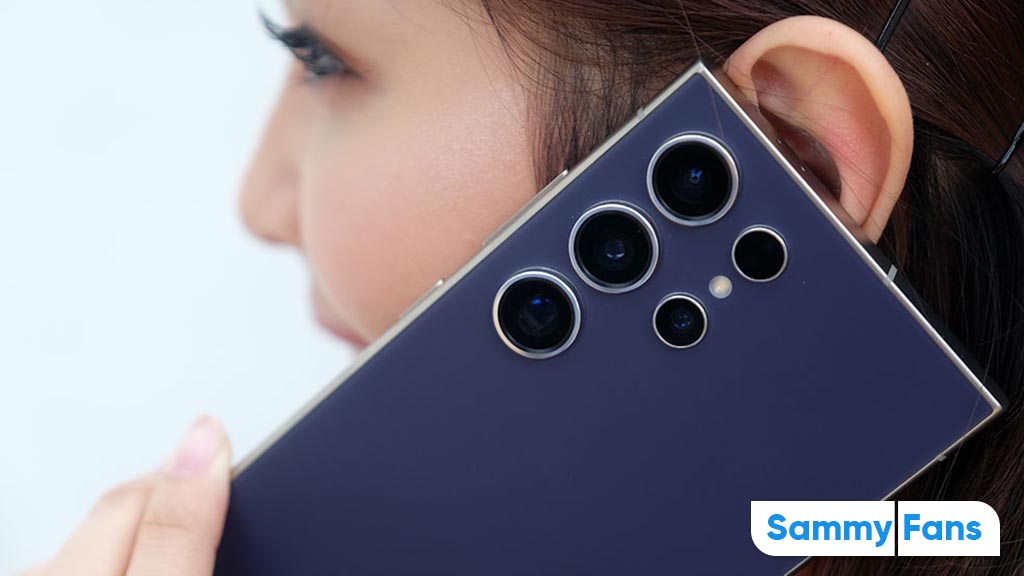
Samsung is rumored to bring 16GB RAM to the Galaxy S25 Ultra. It’s going to be a big upgrade over the recently released flagship phones by Samsung. Meanwhile, it shows the company is taking a U-turn on its decision to reduce the RAM, starting with the S22 Ultra.
Chinese vendors continue to increase RAM on their flagships. Samsung has either reduced or stuck with the same configuration. Well, a major shift seems to be loading, with Samsung Galaxy S25 Ultra being equipped with 16GB RAM, keeping the base storage unchanged.
X user Sawyer Galox claims that the Galaxy S25 Ultra could have increased RAM than the S24 Ultra. The input is based on what specifications are being tested on the prototype model. Notably, Samsung’s S20 Ultra and S21 Ultra debuted 16GB RAM variants.
Starting with the Galaxy S22 Ultra, the South Korean tech giant has reduced the RAM to 12GB. This continued with the Galaxy S23 Ultra and Galaxy S24 Ultra. As Gemini Nano v2 is also rumored to be available in the next flagships, more RAM may be required.
Galaxy S25 Ultra
• 12GB + 256GB
• 16GB + 512GB
• 16GB + 1TB• 6.9 inch
Confirmed in prototype 3 ✅️
— Sawyer Galox (@Sawyergalox) May 8, 2024
Apart from this, a new design language is expected to be introduced with the Galaxy S25 series. After following its signature design from the Galaxy S22 Ultra, the company’s next Ultra flagship would finally bring a much-anticipated design refresh.
As far as other specifications are concerned, an upgraded display with 3000 nits of peak brightness and Snapdragon 8 Gen 4 for Galaxy will likely come. The camera department may also be enhanced with the arrival of enhanced image sensors.
Stay up-to-date on Samsung Galaxy, One UI & Tech Stuffs by following Sammy Fans on X/Twitter. You can also discover the latest news, polls, reviews, and new features for Samsung & Google Apps, Galaxy Phones, and the One UI/Android operating system.
Do you like this post? Kindly, let us know on X/Twitter: we love hearing your feedback! If you prefer using other social platforms besides X, follow/join us on Google News, Facebook, and Telegram.
News
Apple aims 9 million+ OLED iPad sales, 4 million displays from Samsung
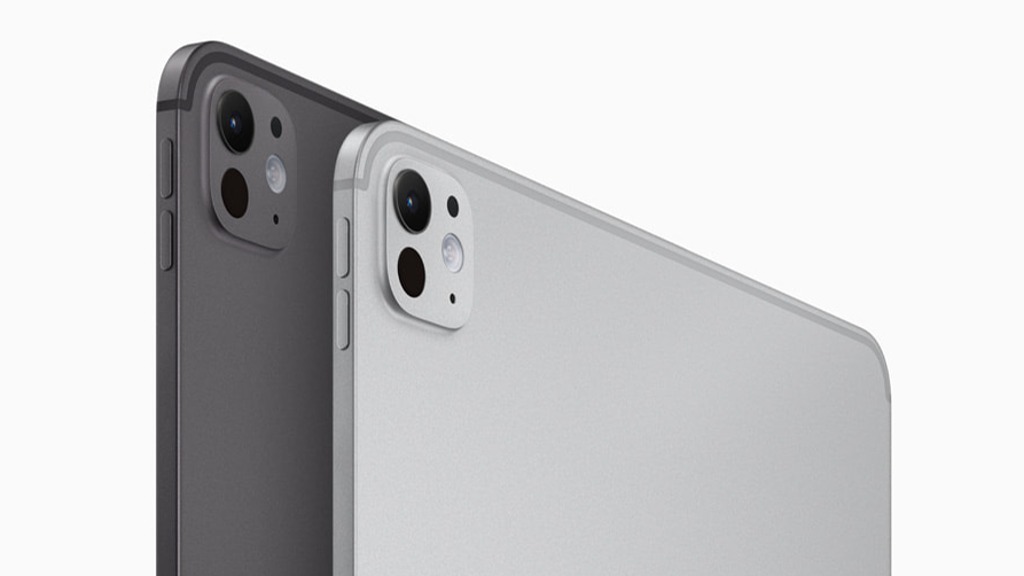
Apple is targeting over 9 million OLED iPad Pro shipments this year. On May 7th, the company launched its first OLED display iPad models. South Korea’s Samsung Display and LG Display are slated to supply OLED panels for the iPad Pro 2024.
Omdia estimates this year’s OLED tablet shipments could be 12.1 million units. The volume of hybrid OLED tablets is 8.12 million units (61.7%), debuted with the Apple iPad Pro 2024. Omdia’s forecast for hybrid OLED tablet shipment of 8.12 million units is mostly iPad Pro OLED.
Recently, TrendForce predicted that this year’s OLED iPad Pro shipment to be 4.5 to 5 million units. The market research firm estimated that the price of the new iPad Pro has increased by $200, which could partially eat into the demand for the OLED iPad Pro.
There’s a major difference in figures. Do note that Omdia’s forecast is based on panels, while Trend Force’s forecast is based on finished products. TrendForce noted that OLED panel shipments could be at least 10% higher than OLED iPad Pro shipments.

Image: Apple
Stay up-to-date on Samsung Galaxy, One UI & Tech Stuffs by following Sammy Fans on X/Twitter. You can also discover the latest news, polls, reviews, and new features for Samsung & Google Apps, Galaxy Phones, and the One UI/Android operating system.
Do you like this post? Kindly, let us know on X/Twitter: we love hearing your feedback! If you prefer using other social platforms besides X, follow/join us on Google News, Facebook, and Telegram.
News
Galaxy S24 boosts Samsung as Apple holds ground in the US

Counterpoint Research published their new report on the US smartphone market. Apple still dominates the US smartphone market, while Samsung managed to score positive growth during the first quarter of the year.
According to the report, Samsung secured a 31% market share in the US in the first quarter of the year. The company achieved this growth from 27% recorded in the first quarter of last year.
Apple managed to keep its 52% share in the market in the same period. Notably, the company neither declined nor grew year over year, however, keeping the performance constant is considered praiseworthy.
Samsung and Apple are the main smartphone vendors in the United States. Thanks to the Galaxy AI induction, the Galaxy S24 flagships helped the company to bolster its market share in the country.
Motorola came third with 9% of the market share in the first quarter, up from 8% last year. Google is next, however, the chart doesn’t mention its market share. Counterpoint’s Maurice said, “Google declined in market share in Q1.”
Pay attention, the US smartphone shipments declined 8% YoY in Q1 2024, the sixth consecutive quarter showing a YoY decline. Sales of low-end shipments declined as carriers pushed for deeper 5G smartphone penetration.
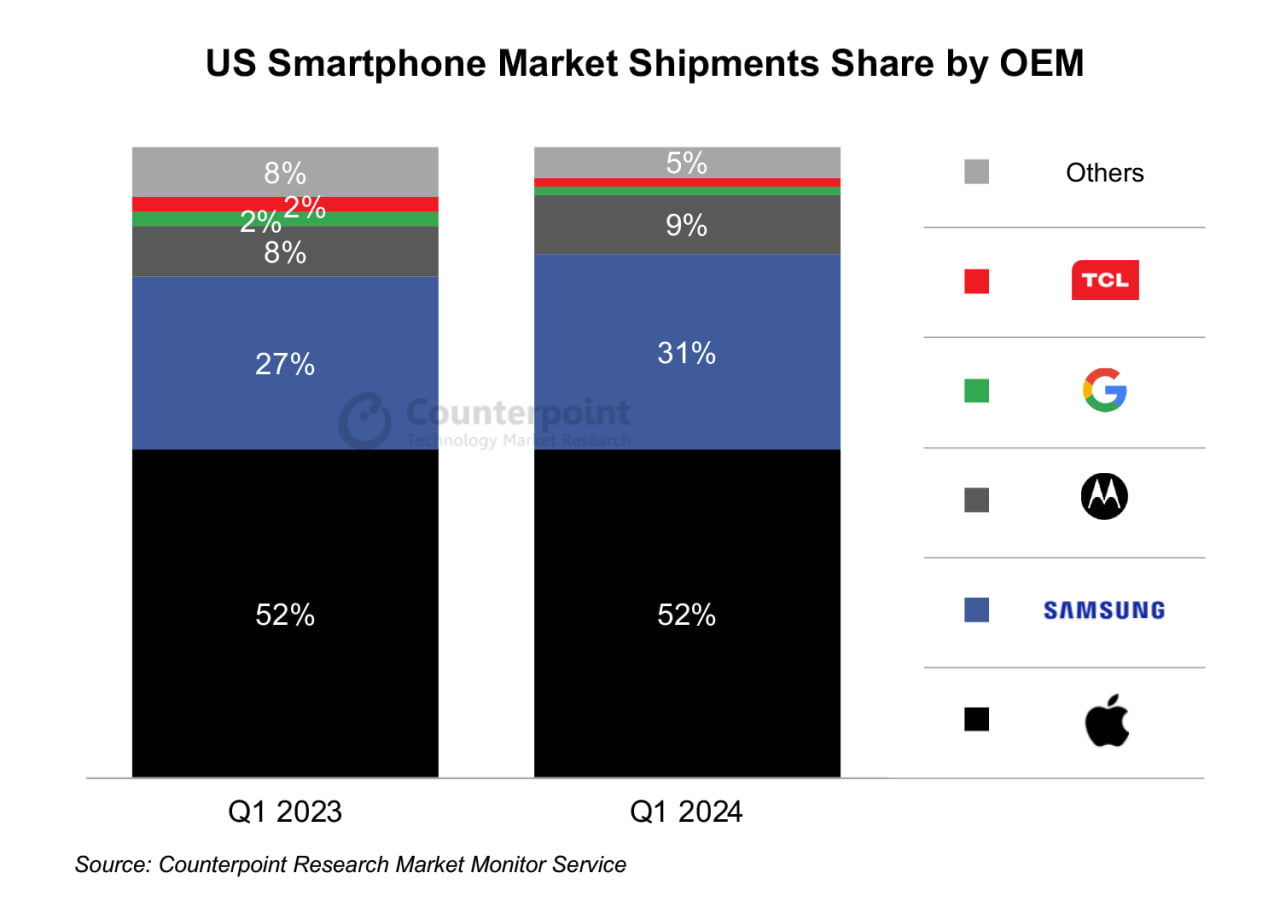
Stay up-to-date on Samsung Galaxy, One UI & Tech Stuffs by following Sammy Fans on X/Twitter. You can also discover the latest news, polls, reviews, and new features for Samsung & Google Apps, Galaxy Phones, and the One UI/Android operating system.
Do you like this post? Kindly, let us know on X/Twitter: we love hearing your feedback! If you prefer using other social platforms besides X, follow/join us on Google News, Facebook, and Telegram.

